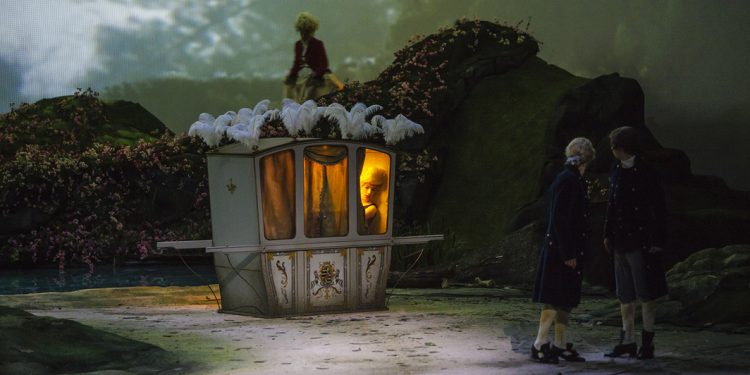Dir: Albert Serra | Cast: Cast: Helmut Berger, Marc Susini, Iliana Zabeth, Laura Poulvet, Baptiste Pinteaux, Théodora Marcadé, Alexander García Düttmann | Drama | Spain 132′
Catalan auteur Albert Serra was born in 1975 in Girona and is known for his delicately drawn and exquisitely mounted historical dramas such as La Mort de Louis XIV (2016); Honour of the Knights (Quixotic) 2006; and Story of My Death (2013). And there’s a great deal of exquisite mounting in his latest feature which stars veteran arthouse star Helmut Berger and competes in the Un Certain Regard sidebar.
The theme in Liberté is essentially voyeurism. If you find yourself in Hampstead Heath on a balmy afternoon you will notice vague male figures wandering around in the shady vegetation. You may even come across a secret tryst (if you are unlucky enough while walking your dog). Take this image and sashay back to the 18th century, somewhere between Potsdam and Berlin, and this is the scenario in Liberté – only here both male and female characters are taking part.
The year is 1774, shortly before the French Revolution. Madame de Dumeval, the Duc de Tesis and the Duc de Wand, libertines expelled from the puritanical court of Louis XVI, seek the support of the legendary Duc de Walchen, German seducer and freethinker, lonely in a country where hypocrisy and false virtue reign. Their mission is to export libertinage, a philosophy of enlightenment founded on the rejection of moral boundaries and authorities, but moreover to find a safe place to pursue their errant games, where the quest for pleasure no longer obeys laws other than those dictated by unfulfilled desires.
This louche cruising amongst bewigged courtiers and aristocrats sounds fascinating, and it is for a while. Soigné and slightly porkier individuals duck and dive in the undergrowth, in various stages of undress, their elegant white linens contrasting with tanned breasts and buttocks, larded legs and bloated beerguts. Very much like Sade, Serra explores the darker side of human desire which gradually becomes more and more explicit to the point where it actually gets a little close for comfort, verging on and eventually becoming explicitly pornographic. There is no narrative as such just a series of vignettes that take place during the hours of darkness one summer night.
Arriving in painted palanquin borne by his henchmen the Duc de Wand (Baptiste Pinteaux) is recounting the execution of an unfortunate individual whose limbs were pulled one by one from his body. Obsessed by bestiality and golden showers, he loves to salivate about his lascivious encounters, often involving dogs or farm animals. Fortunately were are spared the most lurid encounters due to the bosky nocturnal shadows as Artur Tort’s roving camera spies voyeuristically on to various other outré encounters in the semi-darkness of the eucalyptus trees (eucalyptus trees in the 18th century? – check continuity).
Decadence is the watchword here as none of the trysts is particularly joy-filled unless you are into sado masochism or subjugation. The tone is also rather mournful as body fluids are shed and shared. The film’s enigmatic title suggests that these aristos have too much time on their hands and nothing left to lose: Plus ça change, plus c’est la même chose. Serra’s film is brave and extraordinary well made. MT
CANNES FILM FESTIVAL | UN CERTAIN REGARD 2019 | SPECIAL JURY PRIZE

